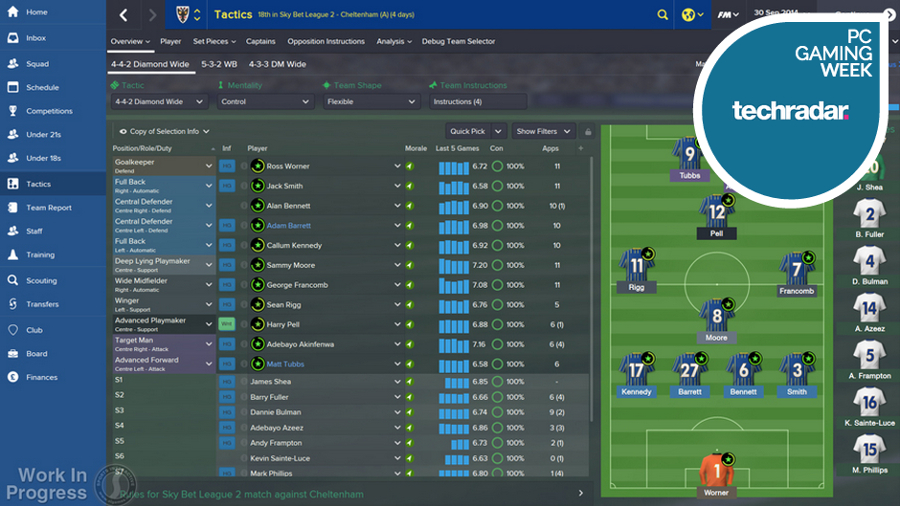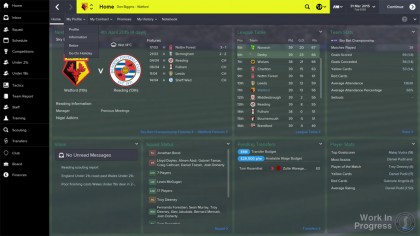
This article was provided to TechRadar for PC Gaming Week by Edge magazine. Follow Edge on Twitter here. Click here for Edge subscription offers.
Tired but happy, Miles Jacobson rubs his eyes as he looks back over a busy year for Sports Interactive, where he serves as studio director. Having partnered with sports performance analyst Prozone, which will license data from Football Manager to pass on to real-world coaches, he oversaw the October release of Alternative Reality, a documentary examining the series' popularity.
And in November there was the small matter of launching Football Manager 15, the latest edition of one of gaming's most enduring series. We're here to discuss Jacobson's 20-year anniversary at Sports Interactive, and where the company takes its acclaimed sims from here.
You've said that one of the most significant moments in your time at SI was when you split with Eidos and signed with Sega as publisher, and Championship Manager became Football Manager. How did you convince everyone that it was the right move?
Because we were all in it together, we'd been discussing it for a while, so we knew that it was a possibility. And, well, people don't tend to leave SI. It sounds a bit wanky, but there is a family here – of the 35 of us that were here when we were bought by Sega, 32 are still here. From the original eight of us, seven are still here. So we've worked together a long time.
I would hope that people don't necessarily see it as a job. It's more like being in a band, and we have to keep the band together. I'm the frontman who doesn't write any of the songs, and the real talent is with the rest of the team. They like having their own private lives and not having to be on Twitter the whole time, so they leave all that other stuff to the lippy little shit who doesn't write the songs, but who tells everyone else what to do.

But I'm a firm believer in talent. And we don't work in the same way as most other studios. Everyone gets to work on every area of the game: the programmers design their own modules based on nuggets of ideas that might have come from here, internally, or from the forums, or from our footballer beta testers or our other beta testers. Those ideas can come from everywhere, and my job as director is to put a jigsaw puzzle together of the best things that are going to fit together for a particular year's game. Then we let the programmers loose on doing their stuff.
Sign up for breaking news, reviews, opinion, top tech deals, and more.
We also typically hire people who are fans of the game – again, if you're working on something you love, it doesn't really feel like a job. So that's how we went about it: by making sure that everyone was happy in the first place. The way Ov and Paul [Collyer, SI co-founders, 'Ov' being short for Oliver] and I were running the studio, we did the kind of things that we would want in a company if we had been working for them. And if you find enough like-minded individuals, you're going to stick together.
That presumably stood you in good stead for your next big challenge, which was convincing the Championship Manager audience to move with you.
Well, we owned our website, and therefore [had a direct line to] the community that had been built on sigames.com that we started building in either '95 or '96, which was quite a while before many others had forums. And we made sure that we had football forums as well as non- football forums from a very early stage; we spoke to the community directly.
Now, of course, we can do it via Twitter, but at that time we were all on the forums talking to people on a daily basis. We didn't just have a community manager doing it, but Ov, Paul and I – and all the rest of the team – were constantly talking to people.
That was quite a forward-thinking approach for the time. Whose idea was that?
It was no one's idea, it was just what we did. No one turned around one day and said, "Right, we're going to set up a forum and we're going to talk to people." You have to remember that when Ov and Paul [founded SI], they were schoolkids. The next few people who started working on the team were schoolfriends of theirs, and then I was introduced as someone who shared the same passions and was just helping out my mates with the expertise that I had. Then a couple of other people came in, who again were brought into the same mentality: that the most important people are the people who play our games.
Because without them, we have to go and get proper jobs. And I had – if you can call working in the music industry a 'proper job' – a job on the side anyway. So there was no conscious effort. All of us were online anyway; all of us were on similar newsgroups and bulletin boards about football.
One of the guys, Sven, who was known as Boa, was hired because I used to make data updates for the game and I used the data editor that he'd written for the game.
I didn't know how to put those data updates online, and he taught me how to put them online. Ov and Paul said, "We're looking for a programmer, do you know anyone?" And I said, "Yeah, there's this bloke in Norway." And a few weeks later, he was in the studio. So hiring people from the community has been something that we did then, and still do. We'd taken on a PR as well a couple of years before, and at that point developers did not have PRs. My attitude was, well, people in the music industry have PRs, so why wouldn't we have PRs as a game developer?
Current page: From Championship Manager to Football Manger
Next Page Admiring the competition